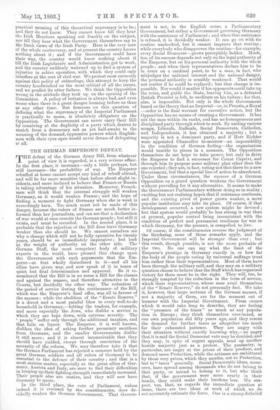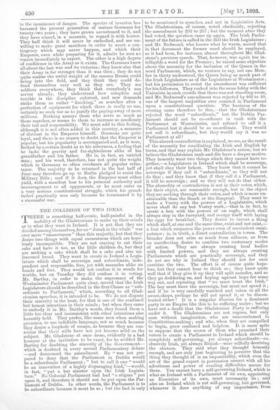THE GERMAN EMPEROR'S DEFEAT. T HE defeat of the German Army
Bill, from whatever point of view it is regarded, is a very serious affair. In the first place, it increases—only a little perhaps, but still increases—the probability of war. The Emperor rebuffed at home cannot accept any kind of rebuff abroad, and will be far more sensitive than before about slight in- cidents, and more inclined to believe that France or Russia is taking advantage of his situation. Moreover, French- men will think that the internal struggle will weaken Germany, as it would weaken France ; and the hope of finding a moment to fight Germany when she is weak is exceedingly keen. Too much must not be made of this danger, because the rulers of France are much better in- formed than her journalists, and can see that a declaration of war would at once reunite the German people ; but still it exists, and must bo recorded. In the second place, it is probable that the rejection of the Bill does leave Germany weaker than she should be. We cannot ourselves see why a change which will not be fully operative for twenty years, should be so immediately imperative ; but look at the weight of authority on the other side. The German Staff, the most competent body of military experts in the world, have pressed this change upon the Government with such arguments that the Em- peror—at first wholly disinclined to it—and all his allies have given way, and now speak of it in tones of quiet but final determination and approval. Be it re- membered that the Bill is in no sense a Bill for the classes and against the masses, and therefore attractive to the Courts, but decidedly the other way. The reduction of the period of service during the continuance-of the Bill, which was the Emperor's final offer, was all in favour of the masses ; while the abolition of the " Ersatz Reserve " is a direct and a most painful blow to every well-to-do household in Germany,—hitting the traders, for example, and more especially the Jews, who dislike a service in which they are kept down, with extreme severity. The ' people " suffer only through the additional taxation, and that falls on liquor. The Emperor, it is well known, dislikes the idea of asking further pecuniary sacrifices from Germans, and the smaller Governments dislike it still more ; and it is almost inconceivable that they should have yielded, except through conviction of the necessity of the reform. We may therefore take it that the German Parliament has rejected a measure held by the great German soldiers and all rulers of Germany to be essential to the defence of their country ; and that is a most serious matter, especially as the great allies of Ger- many, Austria and Italy, are sure to find their difficulties in keeping up their fighting strength immediately increased. Their people also are restive, and they will now have Germany to quote. In the third place, the vote of. Parliament, unless indeed it is reversed by the constituencies, does de- cidedly weaken the German Government. That Govern- ment is not, in the English sense, a Parliamentary Government, but rather a Government governing Germany with the assistance of Parliament ; and when that assistance is refused, it is decidedly weaker. It can go on with its routine unchecked, but it cannot improve that routine ; while everybody who disapproves the routine—for example, every Social Democrat—grows perceptibly bolder. Much, too, of its success depends not only on the legal authority of the Emperor, but on his personal authority with the whole people ; and when their representatives declare him to be in error on a cardinal point, to be a man, in fact, who misjudges the national interest and the national danger, the personal authority is sensibly weakened. That would not matter if he could be replaced ; but that change is im- possible. Nor would it matter if his opponents could take up the reins, and guide the State, leaving him, as a defeated British Premier is left, to meditate on his failure ; for that, also, is impossible. Not only is the whole Government based on the theory that an Imperial—or, in Prussia, a Royal —order is the final warrant for executive action, but the Opposition has no means of creating a Government. It has not the men within its ranks, and has no homogeneous and disciplined party through which to work. By uniting various scraps, Liberals, Radicals, Social Democrats, Catholics, and Independents, it has obtained a majority ; but a majority is not a dominant party, and if Herr Richter were appointed Chancellor to-morrow—an impossibility in the condition of German feeling—the organisation would tumble to pieces in a moment. The Opposition themselves do not hope to take power, but only to drive the Emperor to find a successor for Count Caprivi, and through him to propose some military plan other than the one rejected ; they are, in fact, voting not that there be a new Government, but that a special line of action be abandoned. Under these circumstances, the success of a German Opposition on a grand question weakens the Government without providing for it any alternative. It seems to make the Government Parliamentary without doing so in reality ; exciting but not realising hopes that if resistance continues, and the existing pivot of power grows weaker, a more popular institution may take its place. Of course, if that development occurred, a new system might be devised ; but that system would probably be less strong in war than at present, popular control being inconsistent with the condition of perfect and permanent readiness for war in which Germany, for the present, is compelled to live.
Of course, if the constituencies reverse the judgment of the Reichstag, none of these remarks apply, and the Imperial Government will be stronger than ever ; but this result, though possible, is not the more probable of the two. No one can say what the limit of the Emperor's prestige in Germany exactly is, or how far the body of the people voting by universal suffrage trust him rather than their representatives. Most of them have been through the military mill, and they may on a military question choose to believe that the Staff which has organised victory for them must be in the right. They will, too, be strongly tempted by the reduction in the term of service, which their representatives, whose sons avail themselves of the "Ersatz Reserve," do not personally feel. We take it, however, that large sections of the German masses, if not a majority of them, are for the moment out of humour with the Imperial Government. From causes which it would take long to describe, they are feeling the " pressure of the times " as much as any popula- tion in Europe ; they think themselves over-taxed, as our own population did fifty years ago, and they resent the demand for further taxes as altogether too much for their exhausted patience. They are angry with their situation without exactly knowing why,—so angry that it is said the Social Democrat vote may be doubled, and they may, iu spite of urgent appeals, send up another hostile majority just as a protest. The peasantry, in particular, are angry at the prices of their produce, and demand more Protection, while the artisans are embittered by those very prices, which they ascribe, not to Protection, but to " taxes " generally. Social Democratic ideas, more- over, have spread among thousands who do not belong to that party, or intend to belong to it, but who think that, if the government were more nearly in their hands, they could make their burdens less. We sus- pect, too, that, as regards the immediate question at issue, there are two ideas at work of which we do not accurately estimate the force. One is a strong disbelief in the imminence of danger. The spectre of invasion has harassed the present generation of mature Germans for twenty-two years ; they have grown accustomed to it, and they have ceased, in a measure, to regard it with horror. They half think it will never be embodied, and are un- willing to make great sacrifices in order to avert a con- tingency which may never happen, and which their Emperor, even while preparing for it, admits he sees no reason immediately to expect. The other is a high degree of confidence in the Army as it exists. The Germans know all about the last war and its victories ; they know also that their Army is far stronger than it was then ; they do not quite realise the awful weight of the masses Russia could bring into the field, and they think they could de- fend themselves very well as they are. They see soldiers everywhere, they think that everybody's son serves already, they understand how complete and terrible is the discipline enforced, and new demands strike them as rather " finicking," as searches after a perfection of equipment for which there is really no use, certainly no such use as to justify the paying-away of more millions. Nothing annoys those who serve so much as these searches, or seems to them to increase so needlessly their toil and responsibility. We must add to this feeling, although it is not often added in this country, a measure of distrust in the Emperor himself. Germans are quite loyal, and there is no reason to doubt that the Emperor is popular, but his popularity is accompanied and, as it were, flecked by a certain doubt as to his soberness, a feeling that he lacks the gravity and far-sightedness alike of his grandfather and his father. He is, in fact, an untried man ; and his word, therefore, has not quite the weight which in Germany so often overbears all popular reluc- tance. The majority to be returned in the last half of June may therefore go up to Berlin pledged to resist the Military Bills ; and if it does, the Emperor must either yield, with a manifest loss to his personal authority and encouragement to all oppponents, or he must enter on a very serious constitutional struggle, which his grand- father, practically won only because he terminated it by a successful war.



































 Previous page
Previous page